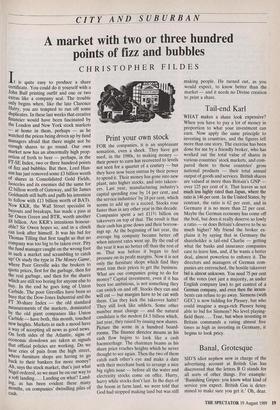Print your own stock
FOR the companies, it is an unpleasant sensation, even a shock. They have got used, in the 1980s, to making money their power to earn has recovered to levels not seen for a quarter of a century — but they have now been outrun by their power to spend it. Their money has gone into new plant, into higher stocks, and into takeov- ers. Last year, manufacturing industry's capital spending rose by 14 per cent, and the service industries' by 18 per cent, which seems to add up to a record. Stocks rose faster than in any other year in this decade. Companies spent a net £111/2 billion on takeovers on top of that. The result is that their cash has gone down and their borrow- ings up. At the beginning of last year, the average big company became better off when interest rates went up. By the end of the year it was no better off than the rest of us. That was before it began to feel pressure on its profit margins. Now it is not only the furniture shops which find they must trim their prices to get the business. What are our companies going to do for money? Capital investment, even if it has been too ambitious, is not something they can switch on and off. Stocks they can and will cut — but margins have to be cut with them. Can they kick the takeover habit? They still look like addicts. Some other number must change — and the natural candidate is the modest £4.5 billion which, last year, they raised by issuing new shares. Picture the scene in a hundred board- rooms. The finance director moans as his cash flow begins to look like a cash haemorrhage. The chairman beams as his share price reaches heights which he never thought to see again. Then the two of them catch each other's eye and make a date with their merchant bank to arrange a nice big rights issue — before all the water and electricity stocks come on offer. Hurry, hurry while stocks don't last. In the days of the boom in farm land, we were told that God had stopped making land but was still making people. He turned out, as you would expect, to know better than the market — and it needs no Divine creation to print a share.


















































 Previous page
Previous page